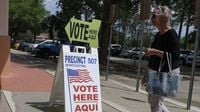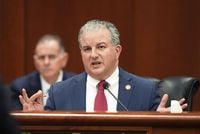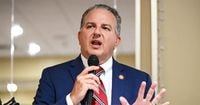In a significant political development, Republican James Patronis has emerged victorious in the special election for Florida’s 1st Congressional District, following the resignation of Rep. Matt Gaetz. The election, held on April 1, 2025, was projected by NBC News to bolster the GOP's slim majority in the U.S. House of Representatives, which now stands at 220-213 with two Democratic vacancies.
Patronis, who previously served as Florida's chief financial officer, defeated Democrat Gay Valimont, a gun violence prevention activist who had lost to Gaetz in the November elections. Gaetz, who had been nominated by President Donald Trump to serve as attorney general, withdrew his name from consideration last year amid controversy. The 1st District, which Trump won by a staggering 37 points in the 2024 election, remained a stronghold for Republicans.
Despite the heavy Republican advantage in the district, the election results indicated a tightening race compared to previous contests. Patronis secured victory with a margin of approximately 15 percentage points, a significant decrease from Gaetz's 32-point win against Valimont just months prior. Valimont had significantly outpaced Patronis in fundraising, raising over $6 million compared to Patronis's campaign finances, which created a sense of anxiety among Republican supporters.
In the 6th Congressional District, Republican state Senator Randy Fine also claimed victory, defeating Democrat Josh Weil by about 14 points. Trump's endorsement played a crucial role in Fine's campaign, as he leveraged his ties to the former president to rally support. Fine had initially switched his endorsement in the 2024 presidential primary from Florida Governor Ron DeSantis to Trump, aligning himself closely with the president's agenda.
The 6th District, which includes Daytona Beach, was previously represented by Mike Waltz, who is now Trump’s national security adviser. Waltz had won his last election by 33 points, emphasizing the Republican dominance in the region. However, Fine faced significant challenges, including being outraised by Weil, who had amassed nearly $10 million for his campaign. The financial disparity raised concerns among Republicans about Fine's ability to maintain the seat.
Trump actively campaigned for both candidates, issuing multiple posts on Truth Social and holding tele-town halls to energize voters. His involvement was deemed necessary as Democrats sought to capitalize on lower turnout in special elections, aiming to leverage grassroots enthusiasm against the Republican incumbents. Fine expressed his gratitude to Trump after his victory, stating on social media, "Because of you, Mr. President. I won't let you down."
While the Republican wins in Florida provided a temporary reprieve for the party amidst growing concerns over Trump's policies and their impact on voter sentiment, the close margins raised alarms about potential discontent among constituents. Recent polling and election outcomes have suggested that even in traditionally Republican districts, voters may be increasingly wary of Trump's aggressive budget cuts, which threaten essential services like food assistance and health care.
Democrats, despite their losses, are framing the results as an indicator of a shifting political landscape. Ken Martin, chair of the Democratic National Committee, remarked on the party's "historic overperformance" in districts that had previously been solidly Republican. The implications of these special elections could reverberate throughout the state and beyond, as Democrats aim to build on this momentum heading into future contests.
As the newly elected Patronis and Fine prepare to take their seats in Congress, they will join their Republican colleagues in navigating a complex legislative agenda. With Trump's priorities—including extending tax cuts and addressing immigration policy—looming large, their roles will be crucial in shaping the future direction of the party and its legislative achievements.
In the wake of these elections, the GOP's ability to maintain its majority will be tested in the coming months, especially as they face increasing scrutiny from voters who are beginning to voice their concerns over the administration's policies. As both parties gear up for the next electoral cycle, the events of April 1 may serve as a bellwether for broader national trends in voter sentiment and party allegiance.









